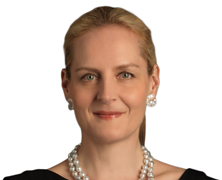Believe you can do it. My parents instilled this guiding principle in my siblings and me at a young age. We could do or be anything. Today, my leadership skills are still rooted in this belief. Too often we’re our own worst enemies and place limitations for why we can’t do something. Maybe we think we’re not qualified or won’t be given a chance. These barriers are only in our minds, and we won’t know what we can achieve until we try.
Life can change quickly—at seventeen, I had to leave school and wait tables for a living. I was at a crossroads, and this experience gave me self-confidence that has shaped my approach to life. I never see obstacles, only solutions. It helps that I’m an optimistic person. Optimism is an underrated quality, but it’s a powerful force. While it’s easy to become gloomy about the future, there are also tremendous opportunities if we change our mindset.
Here’s an important caveat: You need to reinforce your self-belief with experience and the ability to recognize when you’re failing. Failure is a necessary lesson. I didn’t succeed when I first owned my own business, but I learned a lot from the experience. You need the courage to take action and reach out for support and guidance. Mentors have played a critical role in my career—people that I could learn from and would support me as well.
Being courageous in life has rarely been more important. The world is changing rapidly and the opportunities for State Street and similar organizations are increasingly global. It is impossible to stop learning or experiencing new things. I’m a fan of TED, and my TED playlist is an eclectic feast of themes and topics. I’m also excited by the potential for social media to bring us new insights and perspectives—we’re lucky to be able to learn in ways that previous generations could never have imagined. Take advantage of those possibilities.
What does it take to succeed and stay competitive in your position/field?
Commit to lifelong learning and recognize that learning can come from many different inputs, experiential as well as crossgenerational—you can learn as much from younger people as those more senior.
Is there a role model who has had a profound impact on your career and/or life?
What did he/she motivate you to do? I’m most inspired by people who are true to who they are rather than trying to conform to someone else’s expectations or norms. Think of Richard Branson. He redefined the airline industry without ever adopting the classic CEO persona.
What advice would you give young women building/preparing for a career?
First, don’t have any preconceptions about what work/life balance should look like. You need to find that balance for yourself, and it’s likely to involve a series of compromises. Have a strong social and family life, and don’t completely define yourself through your career. My nonprofit work gives me another sense of purpose. Secondly, ask for the advancement you want. It’s easy to become resentful if you wait for recognition to come to you.







